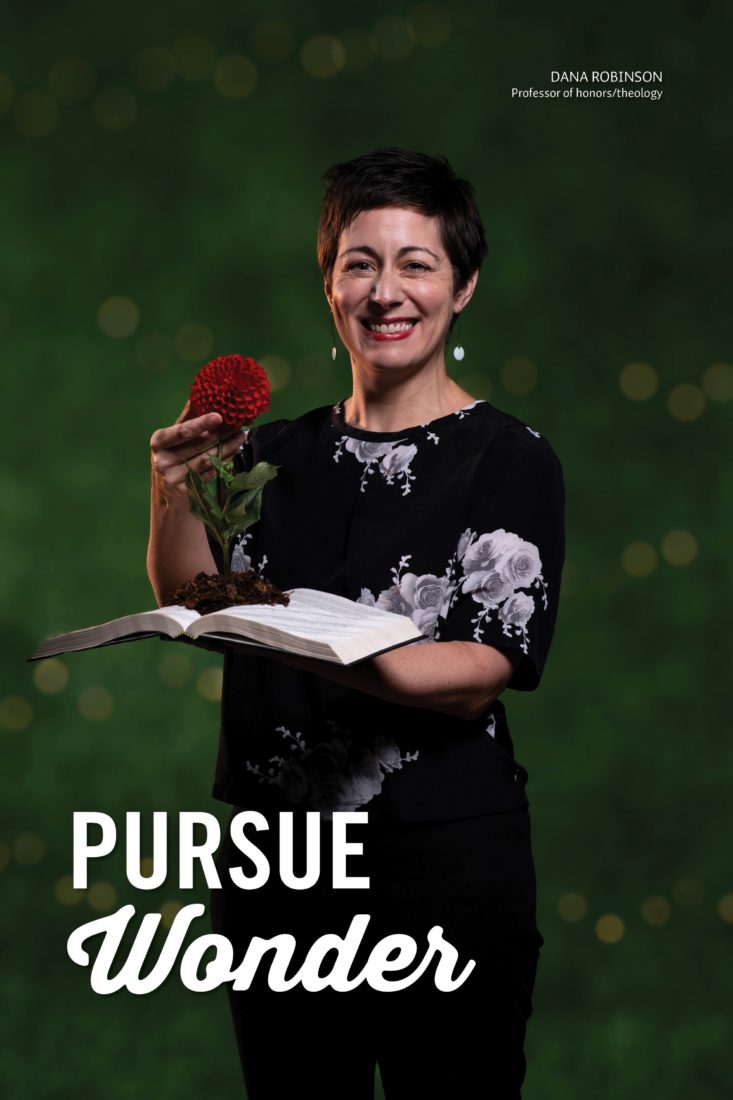Here at the George Fox Library, we’re invested in the virtue of wonder. Our collections connect us to the wonders of the world and inspire us to ask new questions every day. We hope to teach students to engage with wonder as they ask good questions and pursue truth. We also love being connected to the work and expertise of George Fox faculty, and we are thrilled to introduce the Pursue Wonder Project, a monthly feature with faculty from across campus to see how they connect wonder and hope to their work as scholars and educators.
This month, we’re featuring Dana Robinson, Assistant Professor of History and Theology, Associate Director for the Honors Program, and Principal Investigator & Program Director for Liberation Scholars. She was gracious enough to share her thoughts in the interview below:
What’s something that you are curious about?
I’m curious about people in their everyday lives! As a historian of religion, this means I’m curious about how the big philosophical and theological ideas of antiquity actually impacted or showed up in tangible ways for the ordinary person. It also means I like to wander around neighborhoods and catch glimpses of people’s back gardens and front rooms, but not in a creepy way.
How do wonder and curiosity connect to your life as a scholar and instructor?
I never get tired of the physical artifacts of ancient life – small domestic objects, inventories and contracts on papyrus, graffiti on walls. The more I study the past, the more attention I pay to these kinds of sources and how they give us a different view of the world than the literary or philosophical treatises of the educated elites. Even if I can’t figure out what to say about it in an academic way, I love the weird details. Like the town council meeting in third-century Egypt where the council president has it recorded in the minutes that he is ill with a cough in his chest. Or the letter urging the recipient not to worry about the pig, because the chief of police will see to everything. I’ll never know what that is about but I’ll never forget it.
What do you hope to learn more about in the future?
I want to learn more about gardening. My second-half-of-life goal is to be one of those elderly women who potters around in the garden, with rain boots and amazing roses.
I’d also like to learn more about ecological science. There’s lots of practical science connected with gardening, of course, and care of the planet more broadly. But I’m also interested in how ecological patterns could serve as models for more theoretical and philosophical frameworks. Ancient and medieval thinkers used Platonic models of the universe (hierarchical, mirrored spiritual and physical realities, etc.) alongside their own contemporary understanding of science to map the beauty and order of the whole cosmos in a unified but complex way, ancient theories of everything, if you will. I really suspect what we currently know about the structures of the physical universe could also help us understand things like God and the patterns of human history in a new way. I’m sure some theorists have already done this but I strongly suspect that it will blow my mind when I find it. I know this sounds like the opposite of what I said earlier about being interested in the tangible and particular but I’m allowed, right?
How does the pursuit of learning connect to your faith?
I feel like I’ve grown out of the anxiety of my youth about trying to make everything agree and I honestly revel in the creative chaos of new theories or new readings of biblical texts. God is big enough to contain it all, and I’m not interested in reducing the universe down to something I can grasp. That would be boring. To paraphrase Julian of Norwich, God will do a great work of reconciliation in the end. I don’t know what it will be, but I want to expand my own capacity to receive and understand it. That’s a big part of what faith is, in my mind.
What about the things you are learning, researching, or teaching gives you hope?
I study a period of time that used to be called the “Dark Ages” – the late Roman empire and its so-called fall. War, economic crisis, huge wealth inequality, epidemic disease, climate change, you name it, it was happening in the 3rd-6th century Mediterranean. But this period has also emerged as a time of tremendous cultural and religious creativity. This gives me hope that people are adaptable and creative, even and maybe especially in times of upheaval. We can choose from among the resources of our traditions those that tend toward love and justice and beauty going forward, and act meaningfully even in very small ways. Like gardening, perhaps.
